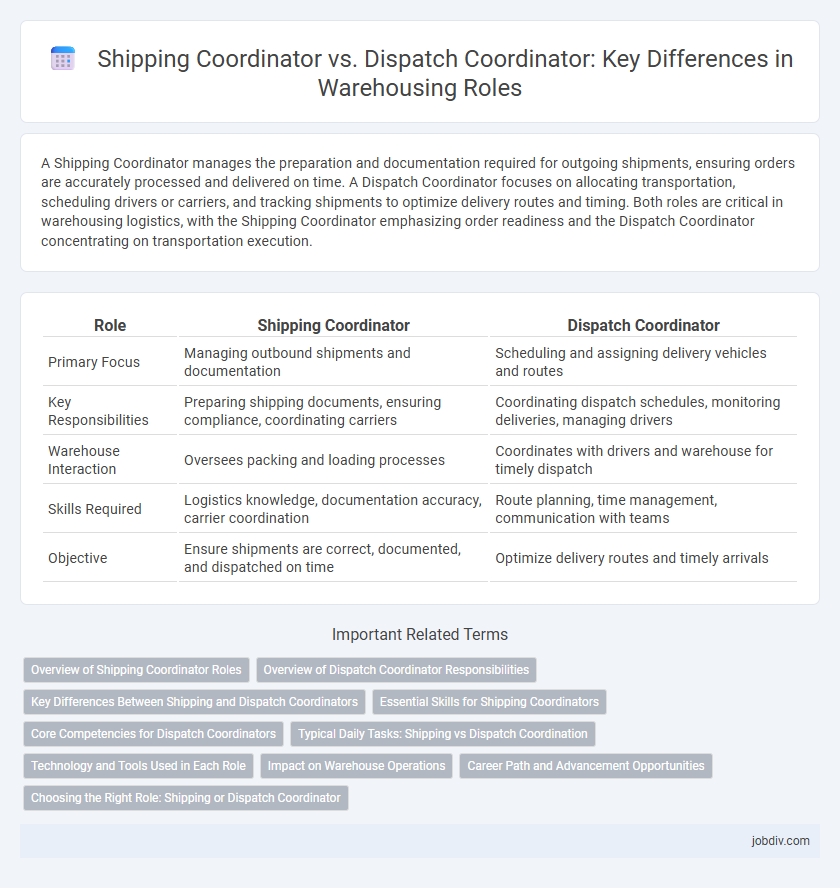A Shipping Coordinator manages the preparation and documentation required for outgoing shipments, ensuring orders are accurately processed and delivered on time. A Dispatch Coordinator focuses on allocating transportation, scheduling drivers or carriers, and tracking shipments to optimize delivery routes and timing. Both roles are critical in warehousing logistics, with the Shipping Coordinator emphasizing order readiness and the Dispatch Coordinator concentrating on transportation execution.
Table of Comparison
| Role | Shipping Coordinator | Dispatch Coordinator |
|---|---|---|
| Primary Focus | Managing outbound shipments and documentation | Scheduling and assigning delivery vehicles and routes |
| Key Responsibilities | Preparing shipping documents, ensuring compliance, coordinating carriers | Coordinating dispatch schedules, monitoring deliveries, managing drivers |
| Warehouse Interaction | Oversees packing and loading processes | Coordinates with drivers and warehouse for timely dispatch |
| Skills Required | Logistics knowledge, documentation accuracy, carrier coordination | Route planning, time management, communication with teams |
| Objective | Ensure shipments are correct, documented, and dispatched on time | Optimize delivery routes and timely arrivals |
Overview of Shipping Coordinator Roles
Shipping coordinators manage the end-to-end process of order shipment, including scheduling pickups, preparing shipping documentation, and ensuring compliance with carrier regulations. They communicate with internal teams and external carriers to track shipments, resolve delays, and maintain accurate inventory records. Their role is crucial for optimizing delivery times and maintaining customer satisfaction in warehouse operations.
Overview of Dispatch Coordinator Responsibilities
A Dispatch Coordinator manages the timely and efficient scheduling of shipments, ensuring accurate communication between warehouse personnel and transport carriers. Key responsibilities include route planning, tracking delivery progress, and resolving shipment delays to optimize supply chain flow. This role demands strong organizational skills and real-time problem-solving to maintain on-time deliveries and high customer satisfaction.
Key Differences Between Shipping and Dispatch Coordinators
Shipping coordinators primarily manage the preparation and documentation of outgoing shipments, ensuring compliance with regulations and timely delivery schedules. Dispatch coordinators focus on the real-time allocation and tracking of vehicles and drivers to optimize route efficiency and meet immediate delivery demands. Key differences include shipping coordinators' emphasis on documentation and regulatory compliance versus dispatch coordinators' operational control and logistics execution.
Essential Skills for Shipping Coordinators
Shipping Coordinators require strong organizational skills to manage shipment schedules, track inventory, and coordinate with carriers effectively. Expertise in logistics software, attention to detail, and clear communication are essential to ensure timely deliveries and accurate documentation. Proficiency in problem-solving and regulatory compliance further supports their role in optimizing the shipping process within warehousing operations.
Core Competencies for Dispatch Coordinators
Dispatch Coordinators excel in route optimization, real-time shipment tracking, and efficient load management to ensure timely deliveries. Their core competencies include strong communication skills for coordinating drivers and warehouse teams, expertise in transportation regulations, and proficiency with logistics software systems. These skills enable Dispatch Coordinators to minimize transit delays and enhance overall supply chain efficiency.
Typical Daily Tasks: Shipping vs Dispatch Coordination
Shipping Coordinators manage the preparation and documentation of outgoing shipments, ensuring accuracy in order processing, labeling, and compliance with shipping regulations. Dispatch Coordinators focus on scheduling and routing deliveries, coordinating with drivers and transportation providers to optimize routes and ensure timely arrivals. Both roles require effective communication and real-time problem-solving to maintain supply chain efficiency and meet customer deadlines.
Technology and Tools Used in Each Role
Shipping Coordinators primarily utilize transportation management systems (TMS) and barcode scanning technology to streamline order fulfillment and track shipments in real-time. Dispatch Coordinators rely heavily on route optimization software and automated communication platforms to efficiently schedule deliveries and manage driver assignments. Both roles increasingly integrate GPS tracking and mobile apps to enhance operational visibility and coordination within warehousing logistics.
Impact on Warehouse Operations
Shipping Coordinators focus on managing outbound shipments, ensuring accurate documentation, timely loading, and compliance with transportation regulations, which enhances order fulfillment efficiency and reduces delivery delays in warehouse operations. Dispatch Coordinators oversee the scheduling and routing of drivers, optimizing transportation logistics and vehicle utilization to minimize wait times and streamline load assignments. The collaboration between Shipping and Dispatch Coordinators directly influences warehouse throughput, operational costs, and customer satisfaction by improving the coordination of shipment preparation and delivery execution.
Career Path and Advancement Opportunities
Shipping Coordinators typically advance by developing expertise in logistics management, moving into senior shipping or supply chain analyst roles. Dispatch Coordinators often progress toward operations management positions, overseeing broader transportation and delivery networks. Both paths offer opportunities in warehouse management, though Shipping Coordinators may have greater access to global supply chain roles.
Choosing the Right Role: Shipping or Dispatch Coordinator
Selecting the right role between Shipping Coordinator and Dispatch Coordinator depends on specific warehousing needs: Shipping Coordinators manage outbound shipments, ensuring accurate packing, documentation, and carrier communication, while Dispatch Coordinators focus on scheduling and routing deliveries to optimize efficiency and meet customer deadlines. Warehouses with complex logistics and multiple shipping carriers benefit from a Shipping Coordinator's expertise, whereas operations emphasizing timely dispatch and driver coordination require a Dispatch Coordinator. Understanding the nuances of inventory flow and delivery timelines aids in choosing the optimal coordinator role to enhance warehouse productivity.
Shipping Coordinator vs Dispatch Coordinator Infographic

 jobdiv.com
jobdiv.com